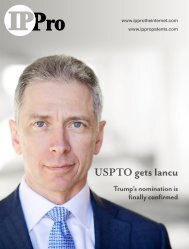IPPro Issue 002
IPPro is the go-to industry publication for news, views, and opinion on patent practice, law and management. The fortnightly publication and accompanying website - the only free-to-read intellectual property resource around - cover the full spectrum of IP law globally, including prosecution, litigation, licensing, management and technology.
IPPro is the go-to industry publication for news, views, and opinion on patent practice, law and management. The fortnightly publication and accompanying website - the only free-to-read intellectual property resource around - cover the full spectrum of IP law globally, including prosecution, litigation, licensing, management and technology.
Create successful ePaper yourself
Turn your PDF publications into a flip-book with our unique Google optimized e-Paper software.
Brexit Update<br />
With more certainty for patent attorneys than others in the IP<br />
profession over their rights post-Brexit, what are the pressing<br />
issues for patent attorneys and firms in the Brexit negotiations?<br />
CIPA has worked with colleagues inside and outside government to<br />
progress the ratification of the Unified Patent Court (UPC) Agreement.<br />
The government has now completed all the necessary legislative<br />
steps and CIPA hopes that formal deposit of ratification of the UPC<br />
Agreement by the UK will happen soon.<br />
Ratification by Germany will still be needed for the agreement to<br />
come into force.<br />
The UPC will be a better and more attractive system with the full<br />
participation of the UK, including as the base for the life sciences<br />
branch of the central division of the UPC. Another issue that requires<br />
attention is the Nagoya Protocol to the Convention on Biological<br />
Diversity (CBD) which obstructs important research on genetic<br />
resources, leading to delay or complete abandonment of crucial work<br />
in areas such as human health and food security.<br />
The protocol needs to be interpreted and enforced in a way which<br />
gives proper weight to all the objectives of the CBD, as well as to<br />
other important public policy objectives.<br />
The EU regulation that applies it fails to do this.<br />
Cards on the table<br />
CIPA has a strong preference for the UK to participate in the unitary<br />
patent and UPC system and for this to continue after Brexit. This<br />
will be best for the UK, for the users of the system, and for the other<br />
member states.<br />
CIPA has published papers and lobbied the government to propose<br />
a sensible and practical framework for interpreting and applying the<br />
Nagoya Protocol in the UK, and urges that the regulation must not be<br />
transposed unchanged into UK law upon Brexit.<br />
Confusion over rights of representation post-Brexit has left some<br />
wondering how patent attorneys will be affected. Stephen Jones, president<br />
of the Chartered Institute of Patent Attorneys, sheds light on the situation<br />
Barney Dixon reports<br />
Rights of representation is a key issue for trademark attorneys in<br />
the Brexit negotiations. Where do patent attorneys stand?<br />
Because the European Patent Convention is not EU legislation<br />
and the European Patent Office (EPO) is not an EU institution, the<br />
European patent system will not be affected by Brexit.<br />
The UK’s 2,300 European qualified patent attorneys will continue to<br />
represent their clients at the EPO after the UK leaves the EU. It will<br />
be business as usual.<br />
This is good news for the UK because the UK’s patent attorneys<br />
contribute up to £1 billion every year to the British economy. The<br />
majority of this comes in fee income from foreign companies choosing<br />
to use British representation.<br />
Of the 40,000 European patent applications filed every year by the<br />
UK’s European patent attorneys, a large proportion are for overseas<br />
clients showing the high regard the rest of the world has for the UK<br />
patent attorney profession. We punch above our weight in Europe,<br />
filing one third of all European patent applications.<br />
Unlike European patents, trade marks in Europe are granted by an EU<br />
institution—the EU Intellectual Property Office, and there is a concern<br />
that UK trade mark attorneys may lose their rights of representation<br />
upon the UK leaving the EU.<br />
The Chartered Institute of Patent Attorneys (CIPA) believes this would<br />
be seriously detrimental to users of the system and disproportionately<br />
so for SMEs as well as smaller professional firms. Along with all<br />
other UK representative bodies CIPA continues to press the UK<br />
Government for clarity on this issue.<br />
What are the common misconceptions around this?<br />
CIPA has devoted considerable time and resources to promoting this<br />
‘business as usual’ message.<br />
The EPO has helped publicise this message, issuing unequivocal<br />
statements on its website.<br />
Despite this, we continue to receive both first hand and anecdotal<br />
evidence that this key message is still poorly understood. This is<br />
perhaps not surprising.<br />
Europe has many meanings in different contexts and it is easy<br />
to be confused, especially for those living and working outside<br />
of Europe.<br />
CIPA has led delegations to our key international markets and<br />
explained the situation to sister patent attorney organisations,<br />
industry groups and the UK government’s global IP attaché network,<br />
relying on these valued friends and colleagues to spread the message<br />
that they can confidently continue to use UK based patent attorneys<br />
for their EPO work and that European patents will still be granted for<br />
the UK before and after Brexit.<br />
What is wrong with the EU regulation that applies to the<br />
Nagoya Protocol? Why is it important that this is not<br />
transposed into UK law?<br />
The Nagoya Protocol is currently enforced throughout the EU<br />
by EU Regulation 511/143, which is so dauntingly complex and<br />
legally onerous that it discourages important medical research<br />
using non-human genetic resources such as animals, leaves<br />
or microbes. There is evidence that some biotech companies<br />
are simply avoiding using biological material obtained after the<br />
protocol came into force, 12 October 2015, because it is simply<br />
too complicated to do so.<br />
As a result, potentially life-saving research into treatments for<br />
disease outbreaks may be abandoned—or not started at all. Also,<br />
important UK research could migrate to the USA, which has not<br />
ratified the protocol. Brexit provides an opportunity to improve<br />
this flawed legislation.<br />
The regulation is over-prescriptive in two respects:<br />
First, it fails to balance the third objective of the Convention<br />
on Biological Diversity—benefit-sharing—with the other two<br />
objectives: to promote its sustainable use and to share equitably<br />
the benefits resulting from such use. Making research more<br />
difficult frustrates the development of new uses for genetic<br />
resources. Fewer new uses mean fewer benefits to share.<br />
Secondly, it disregards all other important objectives of public<br />
policy. These include research freedom in general, and in particular<br />
easing research on vital objectives such as human health and food<br />
security. Even to the extent of not being able to monitor or treat<br />
infectious disease.<br />
A further worry is the suggestion that the protocol should extend<br />
to mere information, for example details of the structure of<br />
biological material in a document, and that a similar protocol be<br />
introduced to cover access and benefit sharing in areas beyond<br />
national jurisdiction, namely the oceans. Given the stifling effect of<br />
the current law it seems inappropriate to extend it further.<br />
What sort of framework does CIPA suggest to replace this?<br />
What the UK should seek to do—as a long term aim—is to<br />
establish a sensible and practicable framework for interpreting<br />
and applying Nagoya. This should recognise the rights of provider<br />
countries to control their genetic resources (that is to say, samples<br />
of resources for which they are the country of origin) while those<br />
samples are within their boundaries. Sovereignty applies within<br />
national boundaries, not worldwide. Once such material was<br />
outside these boundaries, the rights of provider countries would<br />
be limited to enforcing contractual terms against parties with<br />
whom they had made access agreements.<br />
To introduce a new law in the UK conforming with such notions<br />
would require new legislation, drafted with some care. But relaxing<br />
the grip of regulation 511/14 on UK research is too urgent to wait.<br />
On Brexit, the Regulation could be transposed into UK law in the<br />
Great Repeal Bill, but with specific exceptions.<br />
Article 4.8 (imposing special requirements on pathogen research)<br />
could be omitted, and preferably also Article 7.1, so that any<br />
obligation to show ‘due diligence’ would be deferred until a<br />
product was ready for launch. This could be combined with<br />
instructing the enforcing agency to concentrate on ensuring<br />
that any genetic resources sample collecting in Nagoya provider<br />
countries was conducted in accordance with local laws.<br />
24 <strong>IPPro</strong> The Internet www.ipprotheinternet.com 25





